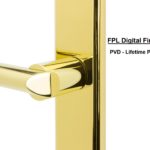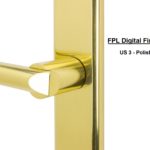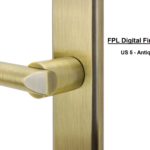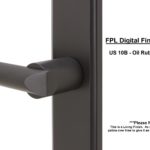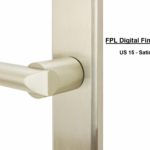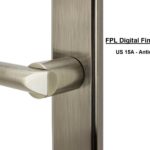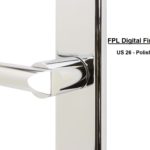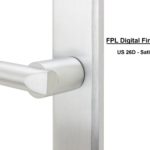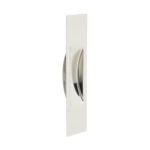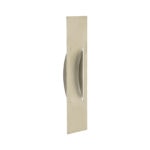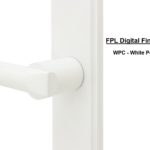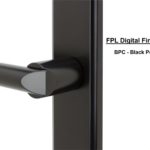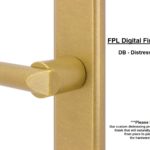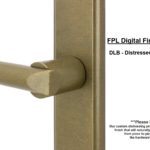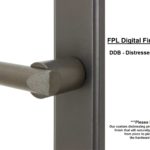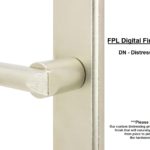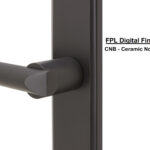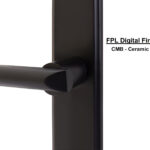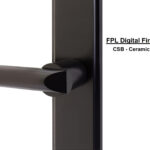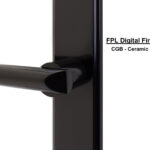General Hardware Maintenance:
DO NOT USE ANY SOLVENTS, POLISHES, CLEANSERS OR ABRASIVES ON THE HARDWARE!!!
If the doors are to be painted, it is important to remove the hardware before doing so to prevent any overspray or spillage on the hardware. Warm mild soapy water and soft cloths only are to be used to clean any hardware after installation.
Keep hinges, track, operating devices, and other parts free of dirt and debris. Do not remove grease from moving components (such as drive gear trains and metal to metal contact areas).
After cleaning, moving parts can be lubricated with a dry graphite powder lubricant made for lubricating door locks (available at most hardware stores and home centers). DO NOT use oil or grease lubricants because they will collect corrosive particles which can cause malfunction.
For additional instructions specific to your finish, please select your finish below.
Because of various atmospheric and weather conditions (especially where the hardware is exposed to high concentrations of salt in the air), weekly care is needed for the Lifetime Brass (PVD) finish. If it is not cleaned weekly, the finish may look like it is tarnished or has failed. Your vehicle would look the same if not cleaned weekly. The salt, calcium, dirt and oil must be removed to maintain its original luster.
TO CLEAN (Recommended Weekly): Gently clean with a mixture of warm soapy water. For added protection, a carnauba car wax (such as Turtle Wax) can be applied monthly. Make sure it contains no abrasives and follow the manufacturer’s directions. Doing so will help the hardware last for years to come!
FOR SEVERE BUILDUP: A heavier duty cleaning product, CLR, can assist the cleaning process. Please follow the directions and safety precautions from the manufacturer.
- Remove the hardware from the fixture it is installed on
- Rubber gloves and eye protection is necessary
- Submerge each piece of hardware into the cleaner
- Wait about 1/2 hour
- Remove the hardware from the solution and rinse with warm running water
- Rub with a paper towel to remove the rest of the salt, calcium, dirt, or oil
- Repeat until all unwanted elements are removed
- Apply a carnauba car wax (such as Turtle Wax) and re-install the hardware
Although salt WILL affect the finish surface, this finish is still recommended for exterior coastal applications, as it is more durable when compared with standard hardware finishes.
The hardware’s finish is protected with either a clear or solid, durable paint. Solvents, polishes, cleansers and abrasives will break down this protective coating, the finish will be damaged and all warranties will be void.
TO CLEAN (Recommended Weekly): Use mild soapy water, rinse and dry with a soft cloth. For added protection, a carnauba car wax (such as Turtle Wax) can be applied monthly. Make sure it contains no abrasives and follow the manufacturer’s directions. Doing so will help the hardware last for years to come!
NOT recommended for exterior coastal applications.
The hardware’s finish is protected with either a clear or solid, durable paint. Solvents, polishes, cleansers and abrasives will break down this protective coating, the finish will be damaged and all warranties will be void.
TO CLEAN (Recommended Weekly): Use mild soapy water, rinse and dry with a soft cloth. For added protection, a carnauba car wax (such as Turtle Wax) can be applied monthly. Make sure it contains no abrasives and follow the manufacturer’s directions. Doing so will help the hardware last for years to come!
NOT recommended for exterior coastal applications.
The oil rubbed bronze finish is an oxidized black copper finish. You can expect to have variations of color from piece to piece. Oil rubbed bronze is a “living finish” and changes color over time depending upon usage and weather conditions. It is not uncommon to have worn edges and even green patina accents in heavier salt climates, lending to it an artisan old world look.
TO CLEAN (Recommended Weekly): Just pat gently with a damp, soft cloth and pat dry. Do not perform any abrasive cleaning action like scrubbing or polishing. Do not wax. Just let nature take its course and enjoy its natural beauty!
Although salt WILL affect the finish surface, this finish is still recommended for exterior coastal applications. Since it is designed to wear and patina, the salt environment will simply speed this along.
The hardware’s finish is protected with either a clear or solid, durable paint. Solvents, polishes, cleansers and abrasives will break down this protective coating, the finish will be damaged and all warranties will be void.
TO CLEAN (Recommended Weekly): Use mild soapy water, rinse and dry with a soft cloth. For added protection, a carnauba car wax (such as Turtle Wax) can be applied monthly. Make sure it contains no abrasives and follow the manufacturer’s directions. Doing so will help the hardware last for years to come!
NOT recommended for exterior coastal applications.
The hardware’s finish is protected with either a clear or solid, durable paint. Solvents, polishes, cleansers and abrasives will break down this protective coating, the finish will be damaged and all warranties will be void.
TO CLEAN (Recommended Weekly): Use mild soapy water, rinse and dry with a soft cloth. For added protection, a carnauba car wax (such as Turtle Wax) can be applied monthly. Make sure it contains no abrasives and follow the manufacturer’s directions. Doing so will help the hardware last for years to come!
NOT recommended for exterior coastal applications.
Because of various atmospheric and weather conditions (especially where the hardware is exposed to high concentrations of salt in the air), weekly care is needed for the Polished Chrome (US 26) finish. If it is not cleaned weekly, the finish may look like it is tarnished or has failed. Your vehicle would look the same if not cleaned weekly. The salt, calcium, dirt and oil must be removed to maintain its original luster.
TO CLEAN (Recommended Weekly): Gently clean with a mixture of warm soapy water. For added protection, a carnauba car wax (such as Turtle Wax) can be applied monthly. Make sure it contains no abrasives and follow the manufacturer’s directions. Doing so will help the hardware last for years to come!
FOR SEVERE BUILDUP: A heavier duty cleaning product, CLR, can assist the cleaning process. Please follow the directions and safety precautions from the manufacturer.
- Remove the hardware from the fixture it is installed on
- Rubber gloves and eye protection is necessary
- Submerge each piece of hardware into the cleaner
- Wait about 1/2 hour
- Remove the hardware from the solution and rinse with warm running water
- Rub with a paper towel to remove the rest of the salt, calcium, dirt, or oil
- Repeat until all unwanted elements are removed
- Apply a carnauba car wax (such as Turtle Wax) and re-install the hardware
Although salt WILL affect the finish surface, this finish is still recommended for exterior coastal applications, as it is more durable when compared with standard hardware finishes.
Because of various atmospheric and weather conditions (especially where the hardware is exposed to high concentrations of salt in the air), weekly care is needed for the Satin Chrome (US 26D) finish. If it is not cleaned weekly, the finish may look like it is tarnished or has failed. Your vehicle would look the same if not cleaned weekly. The salt, calcium, dirt and oil must be removed to maintain its original luster.
TO CLEAN (Recommended Weekly): Gently clean with a mixture of warm soapy water. For added protection, a carnauba car wax (such as Turtle Wax) can be applied monthly. Make sure it contains no abrasives and follow the manufacturer’s directions. Doing so will help the hardware last for years to come!
FOR SEVERE BUILDUP: A heavier duty cleaning product, CLR, can assist the cleaning process. Please follow the directions and safety precautions from the manufacturer.
- Remove the hardware from the fixture it is installed on
- Rubber gloves and eye protection is necessary
- Submerge each piece of hardware into the cleaner
- Wait about 1/2 hour
- Remove the hardware from the solution and rinse with warm running water
- Rub with a paper towel to remove the rest of the salt, calcium, dirt, or oil
- Repeat until all unwanted elements are removed
- Apply a carnauba car wax (such as Turtle Wax) and re-install the hardware
Although salt WILL affect the finish surface, this finish is still recommended for exterior coastal applications, as it is more durable when compared with standard hardware finishes.
Stainless Steel is protected from corrosion by a thin layer of chromium oxide. This occurs naturally with Stainless Steel. Oxygen from the atmosphere combines with the chromium in the Stainless Steel to form a passive chromium oxide film that protects the metal from FURTHER corrosion. If left alone with no cleaning, Stainless Steel is a ‘living finish’ that will change color over time depending on usage and weather conditions. It is not uncommon to see light and dark brown and black blotchy staining and rusting, lending to it an artisan look while still being functional. The extent to which it is cared for and maintained will impact how long it will last. However, dirt, oils, salts, and other contaminates that can corrode on their own interrupt this natural passivization process and trap corrosive agents on the surface of the Stainless Steel. This reduces it’s corrosion protection, and WILL cause Stainless Steel to rust.
TO CLEAN (Required Weekly): DO NOT use any cleaning product containing Chloride, which will ruin Stainless Steel. Warm soapy water can be used, then rinse and dry with a soft cloth.
FOR STAINS, FINGERPRINTS, DISCOLORATION: When removing stains, fingerprints, and discoloration, any rubbing should be done in the direction of the finish lines. ONLY use the following products (recommended by the Stainless Steel Industry of North America, or SSINA; visit their website for more info):
- 3M Stainless Steel Cleaner & Polish
- Arcal 20
- Lac-O-Nu
- Lumin Wash
- O’Cedar Cream Polish
- Stainless Shine
NOT recommended for exterior coastal applications.
Stainless Steel is protected from corrosion by a thin layer of chromium oxide. This occurs naturally with Stainless Steel. Oxygen from the atmosphere combines with the chromium in the Stainless Steel to form a passive chromium oxide film that protects the metal from FURTHER corrosion. If left alone with no cleaning, Stainless Steel is a ‘living finish’ that will change color over time depending on usage and weather conditions. It is not uncommon to see light and dark brown and black blotchy staining and rusting, lending to it an artisan look while still being functional. The extent to which it is cared for and maintained will impact how long it will last. However, dirt, oils, salts, and other contaminates that can corrode on their own interrupt this natural passivization process and trap corrosive agents on the surface of the Stainless Steel. This reduces it’s corrosion protection, and WILL cause Stainless Steel to rust.
TO CLEAN (Required Weekly): DO NOT use any cleaning product containing Chloride, which will ruin Stainless Steel. Warm soapy water can be used, then rinse and dry with a soft cloth.
FOR STAINS, FINGERPRINTS, DISCOLORATION: When removing stains, fingerprints, and discoloration, any rubbing should be done in the direction of the finish lines. ONLY use the following products (recommended by the Stainless Steel Industry of North America, or SSINA; visit their website for more info):
- 3M Stainless Steel Cleaner & Polish
- Arcal 20
- Lac-O-Nu
- Lumin Wash
- O’Cedar Cream Polish
- Stainless Shine
NOT recommended for exterior coastal applications.
The hardware’s finish is protected with either a clear or solid, durable paint. Solvents, polishes, cleansers and abrasives will break down this protective coating, the finish will be damaged and all warranties will be void.
TO CLEAN (Recommended Weekly): Use mild soapy water, rinse and dry with a soft cloth. For added protection, a carnauba car wax (such as Turtle Wax) can be applied monthly. Make sure it contains no abrasives and follow the manufacturer’s directions. Doing so will help the hardware last for years to come!
NOT recommended for exterior coastal applications.
The hardware’s finish is protected with either a clear or solid, durable paint. Solvents, polishes, cleansers and abrasives will break down this protective coating, the finish will be damaged and all warranties will be void.
TO CLEAN (Recommended Weekly): Use mild soapy water, rinse and dry with a soft cloth. For added protection, a carnauba car wax (such as Turtle Wax) can be applied monthly. Make sure it contains no abrasives and follow the manufacturer’s directions. Doing so will help the hardware last for years to come!
NOT recommended for exterior coastal applications.
The hardware’s finish is protected with either a clear or solid, durable paint. Solvents, polishes, cleansers and abrasives will break down this protective coating, the finish will be damaged and all warranties will be void.
TO CLEAN (Recommended Weekly): Use mild soapy water, rinse and dry with a soft cloth. For added protection, a carnauba car wax (such as Turtle Wax) can be applied monthly. Make sure it contains no abrasives and follow the manufacturer’s directions. Doing so will help the hardware last for years to come!
NOT recommended for exterior coastal applications.
The hardware’s finish is protected with either a clear or solid, durable paint. Solvents, polishes, cleansers and abrasives will break down this protective coating, the finish will be damaged and all warranties will be void.
TO CLEAN (Recommended Weekly): Use mild soapy water, rinse and dry with a soft cloth. For added protection, a carnauba car wax (such as Turtle Wax) can be applied monthly. Make sure it contains no abrasives and follow the manufacturer’s directions. Doing so will help the hardware last for years to come!
NOT recommended for exterior coastal applications.
The hardware’s finish is protected with either a clear or solid, durable paint. Solvents, polishes, cleansers and abrasives will break down this protective coating, the finish will be damaged and all warranties will be void.
TO CLEAN (Recommended Weekly): Use mild soapy water, rinse and dry with a soft cloth. For added protection, a carnauba car wax (such as Turtle Wax) can be applied monthly. Make sure it contains no abrasives and follow the manufacturer’s directions. Doing so will help the hardware last for years to come!
NOT recommended for exterior coastal applications.
The hardware’s finish is protected with either a clear or solid, durable paint. Solvents, polishes, cleansers and abrasives will break down this protective coating, the finish will be damaged and all warranties will be void.
TO CLEAN (Recommended Weekly): Use mild soapy water, rinse and dry with a soft cloth. For added protection, a carnauba car wax (such as Turtle Wax) can be applied monthly. Make sure it contains no abrasives and follow the manufacturer’s directions. Doing so will help the hardware last for years to come!
NOT recommended for exterior coastal applications.
FPL Hardware Ceramic Coatings provide superior protection to other finish methods. Please note the following advantages, as well additional instructions specific to each finish:
The finish is made up of a thin, extremely durable Ceramic Coating that provides superior protection compared with other finishes. It does still require care and maintenance. While Ceramic Coatings are chemically resistant, solvents, polishes, cleansers and abrasives will eventually break down the finish. Therefore, the best cleaning practices are found below:
TO CLEAN (Recommended Weekly): Use mild soapy water, rinse and dry with a soft cloth. Doing so will help the hardware last for years to come!
Although salt WILL affect the finish surface, this finish is still recommended for exterior coastal applications, as it is more durable when compared with standard hardware finishes.
The finish is made up of a thin, extremely durable Ceramic Coating that provides superior protection compared with other finishes. It does still require care and maintenance. While Ceramic Coatings are chemically resistant, solvents, polishes, cleansers and abrasives will eventually break down the finish. Therefore, the best cleaning practices are found below:
TO CLEAN (Recommended Weekly): Use mild soapy water, rinse and dry with a soft cloth. Doing so will help the hardware last for years to come!
Although salt WILL affect the finish surface, this finish is still recommended for exterior coastal applications, as it is more durable when compared with standard hardware finishes.
The finish is made up of a thin, extremely durable Ceramic Coating that provides superior protection compared with other finishes. It does still require care and maintenance. While Ceramic Coatings are chemically resistant, solvents, polishes, cleansers and abrasives will eventually break down the finish. Therefore, the best cleaning practices are found below:
TO CLEAN (Recommended Weekly): Use mild soapy water, rinse and dry with a soft cloth. Doing so will help the hardware last for years to come!
Although salt WILL affect the finish surface, this finish is still recommended for exterior coastal applications, as it is more durable when compared with standard hardware finishes.
The finish is made up of a thin, extremely durable Ceramic Coating that provides superior protection compared with other finishes. It does still require care and maintenance. While Ceramic Coatings are chemically resistant, solvents, polishes, cleansers and abrasives will eventually break down the finish. Therefore, the best cleaning practices are found below:
TO CLEAN (Recommended Weekly): Use mild soapy water, rinse and dry with a soft cloth. Doing so will help the hardware last for years to come!
Although salt WILL affect the finish surface, this finish is still recommended for exterior coastal applications, as it is more durable when compared with standard hardware finishes.

